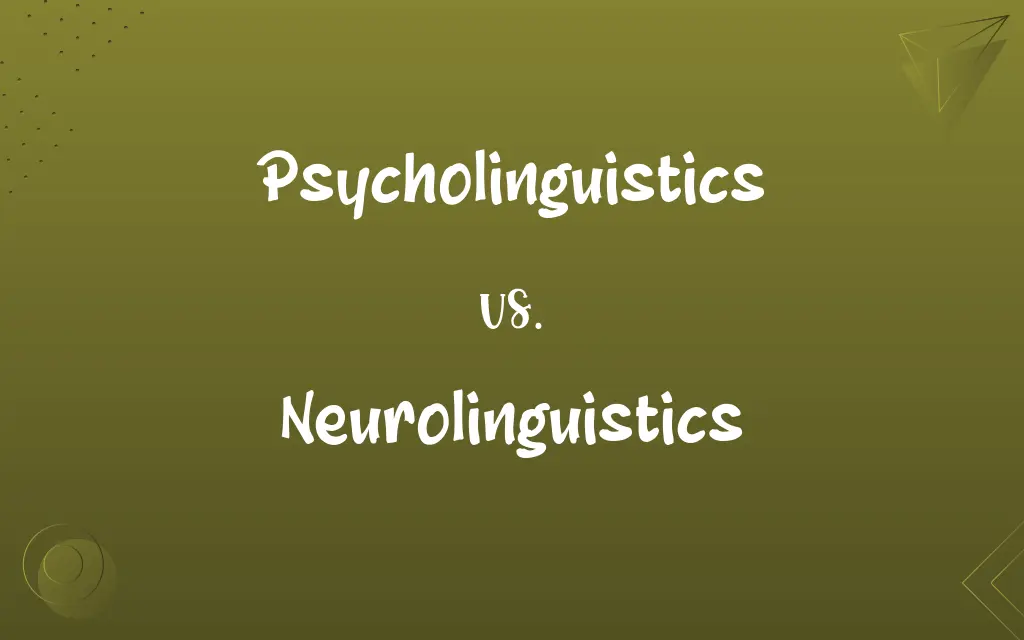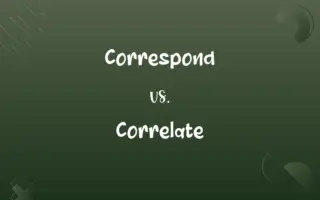Psycholinguistics vs. Neurolinguistics: Know the Difference

By Shumaila Saeed || Updated on December 25, 2023
Psycholinguistics studies the psychological aspects of language; neurolinguistics focuses on the brain's role in language processing.

Key Differences
Psycholinguistics explores how language is acquired, understood, and produced from a psychological perspective, focusing on mental processes and structures. It delves into how children learn language and how adults process and understand it. Neurolinguistics is concerned with the neurological underpinnings of these language processes. It investigates how different areas of the brain contribute to language acquisition, comprehension, and production.
Shumaila Saeed
Dec 01, 2023
Psycholinguistics examines phenomena such as language development, comprehension, production, and deterioration over time. It looks at how we construct meaning, use context, and develop linguistic skills. Neurolinguistics focuses on the brain's mechanisms that enable these functions. It studies brain damage impacts on language and uses techniques like MRI to observe brain activity during language tasks.
Shumaila Saeed
Dec 01, 2023
Psycholinguistics is interested in the cognitive aspects of language, such as memory, perception, and problem-solving in language use. It often uses experimental methods to understand how people use language in real time. Neurolinguistics looks at the brain’s structures and neural pathways that facilitate language. It often collaborates with fields like neurology and cognitive neuroscience to understand language disorders.
Shumaila Saeed
Dec 01, 2023
Psycholinguistics includes studying language disorders from a psychological standpoint, such as dyslexia or language delay. It seeks to understand how these issues manifest in terms of cognitive processing. Neurolinguistics approaches these disorders by examining brain lesions or abnormalities that might cause them. It aims to link specific language impairments with particular areas of the brain.
Shumaila Saeed
Dec 01, 2023
Psycholinguistics often overlaps with fields like psychology, linguistics, and education, providing insights into teaching methods and language learning strategies. Neurolinguistics intersects with neurology, neurosurgery, and psychiatry, offering clinical applications in diagnosing and treating language-related neurological disorders.
Shumaila Saeed
Dec 01, 2023
ADVERTISEMENT
Comparison Chart
Applications
Language learning, teaching strategies
Clinical diagnosis, treatment of language disorders
Shumaila Saeed
Dec 01, 2023
Related Fields
Psychology, linguistics, education
Neurology, cognitive neuroscience, neurosurgery
Shumaila Saeed
Dec 01, 2023
Study of Disorders
Cognitive processing aspects
Brain lesions, neural pathways
Shumaila Saeed
Dec 01, 2023
ADVERTISEMENT
Psycholinguistics and Neurolinguistics Definitions
Psycholinguistics
Study of Language Processing
Psycholinguistics examines how we comprehend spoken words in real-time conversation.
Shumaila Saeed
Dec 01, 2023
Neurolinguistics
Language Disorders and the Brain
Neurolinguistics studies the neural correlates of developmental language disorders.
Shumaila Saeed
Dec 01, 2023
Psycholinguistics
Language Production and Comprehension
Psycholinguistics studies why some individuals have difficulties in articulating words.
Shumaila Saeed
Dec 01, 2023
Neurolinguistics
Neurological Basis of Language
Neurolinguistics explores the brain regions activated during bilingual speech.
Shumaila Saeed
Dec 01, 2023
Psycholinguistics
Linguistic Cognitive Processes
Psycholinguistics analyzes how memory affects our ability to learn new languages.
Shumaila Saeed
Dec 01, 2023
ADVERTISEMENT
Neurolinguistics
Brain-Language Relationship
Neurolinguistics examines how brain injuries can affect speech and language comprehension.
Shumaila Saeed
Dec 01, 2023
Psycholinguistics
Psychological Aspects of Language
Psycholinguistics explores the relationship between linguistic ability and cognitive functions.
Shumaila Saeed
Dec 01, 2023
Neurolinguistics
Neural Mechanisms of Language
Neurolinguistics investigates the recovery of language abilities after a stroke.
Shumaila Saeed
Dec 01, 2023
Psycholinguistics
Language Acquisition Analysis
Psycholinguistics investigates how children develop language skills from infancy.
Shumaila Saeed
Dec 01, 2023
Neurolinguistics
Brain Imaging in Language Study
Neurolinguistics uses MRI to observe how the brain processes different languages.
Shumaila Saeed
Dec 01, 2023
Psycholinguistics
The study of the influence of psychological factors on the development, use, and interpretation of language.
Shumaila Saeed
Oct 19, 2023
Neurolinguistics
(linguistics) Science concerned with the human brain mechanisms underlying the comprehension, production and abstract knowledge of language, be it spoken, signed or written.
Shumaila Saeed
Oct 19, 2023
Psycholinguistics
(linguistics) The interdisciplinary field of study which concerns the acquisition, comprehension and production of language in its spoken, written and signed forms, using concepts and approaches from linguistics, psychology and cognitive science.
Psycholinguistics is mainly concerned with the mechanisms by which language is processed and represented in the mind and brain: i.e., the psychological and neurobiological factors that enable humans to acquire, comprehend, produce and use language.
Shumaila Saeed
Oct 19, 2023
Neurolinguistics
The branch of linguistics that studies the relation between language and the structure and function of the nervous system
Shumaila Saeed
Oct 19, 2023
Psycholinguistics
The branch of cognitive psychology that studies the psychological basis of linguistic competence and performance
Shumaila Saeed
Oct 19, 2023
Repeatedly Asked Queries
Can neurolinguistics help in language teaching?
Neurolinguistics provides insights into how the brain processes language, which can inform effective language teaching strategies.
Shumaila Saeed
Dec 01, 2023
Do neurolinguists work with patients?
Neurolinguists often work with patients, especially those with language disorders due to neurological issues.
Shumaila Saeed
Dec 01, 2023
How does neurolinguistics differ from psycholinguistics?
Neurolinguistics focuses specifically on the brain's role in language processing, while psycholinguistics covers broader psychological aspects of language.
Shumaila Saeed
Dec 01, 2023
Can psycholinguistics explain why some people are bilingual?
Psycholinguistics explores how and why individuals can learn and use multiple languages.
Shumaila Saeed
Dec 01, 2023
What methods do psycholinguists use?
Psycholinguists use experimental and observational methods to study language processing.
Shumaila Saeed
Dec 01, 2023
How does neurolinguistics contribute to understanding language disorders?
Neurolinguistics helps in identifying the brain regions and functions involved in specific language disorders.
Shumaila Saeed
Dec 01, 2023
Are brain imaging techniques important in neurolinguistics?
Brain imaging techniques like MRI are crucial in neurolinguistics for studying the brain's language centers.
Shumaila Saeed
Dec 01, 2023
What is psycholinguistics?
Psycholinguistics is the study of the psychological and neurobiological factors that enable humans to acquire, use, and understand language.
Shumaila Saeed
Dec 01, 2023
Is psycholinguistics a branch of psychology or linguistics?
Psycholinguistics is an interdisciplinary field that bridges both psychology and linguistics.
Shumaila Saeed
Dec 01, 2023
Can psycholinguistics help with language learning disabilities?
Psycholinguistics can offer insights into the nature of language learning disabilities and potential interventions.
Shumaila Saeed
Dec 01, 2023
Does neurolinguistics overlap with other sciences?
Yes, neurolinguistics overlaps with fields like neurology, psychology, and cognitive neuroscience.
Shumaila Saeed
Dec 01, 2023
What topics does psycholinguistics cover?
Psycholinguistics covers language acquisition, comprehension, production, and deterioration.
Shumaila Saeed
Dec 01, 2023
What role does neurolinguistics play in stroke recovery?
Neurolinguistics plays a key role in understanding and aiding the recovery of language abilities after a stroke.
Shumaila Saeed
Dec 01, 2023
What tools are used in neurolinguistic research?
Neurolinguistic research commonly uses tools like EEG, fMRI, and PET scans.
Shumaila Saeed
Dec 01, 2023
How does neurolinguistics explain aphasia?
Neurolinguistics explains aphasia by studying how brain damage affects language abilities.
Shumaila Saeed
Dec 01, 2023
Can neurolinguistics inform speech therapy?
Neurolinguistics provides valuable insights for speech therapy, particularly for neurological language impairments.
Shumaila Saeed
Dec 01, 2023
Are there different branches within psycholinguistics?
Yes, psycholinguistics includes branches like developmental linguistics, neurolinguistics, and sociolinguistics.
Shumaila Saeed
Dec 01, 2023
Does psycholinguistics study sign languages?
Psycholinguistics studies all forms of language, including sign languages.
Shumaila Saeed
Dec 01, 2023
Is psycholinguistics relevant in artificial intelligence?
Psycholinguistics informs the development of AI in areas like natural language processing and understanding.
Shumaila Saeed
Dec 01, 2023
How does psycholinguistics view language evolution?
Psycholinguistics explores how language has evolved and developed in humans over time.
Shumaila Saeed
Dec 01, 2023
Share this page
Link for your blog / website
HTML
Link to share via messenger
About Author
Written by
Shumaila SaeedShumaila Saeed, an expert content creator with 6 years of experience, specializes in distilling complex topics into easily digestible comparisons, shining a light on the nuances that both inform and educate readers with clarity and accuracy.





































































